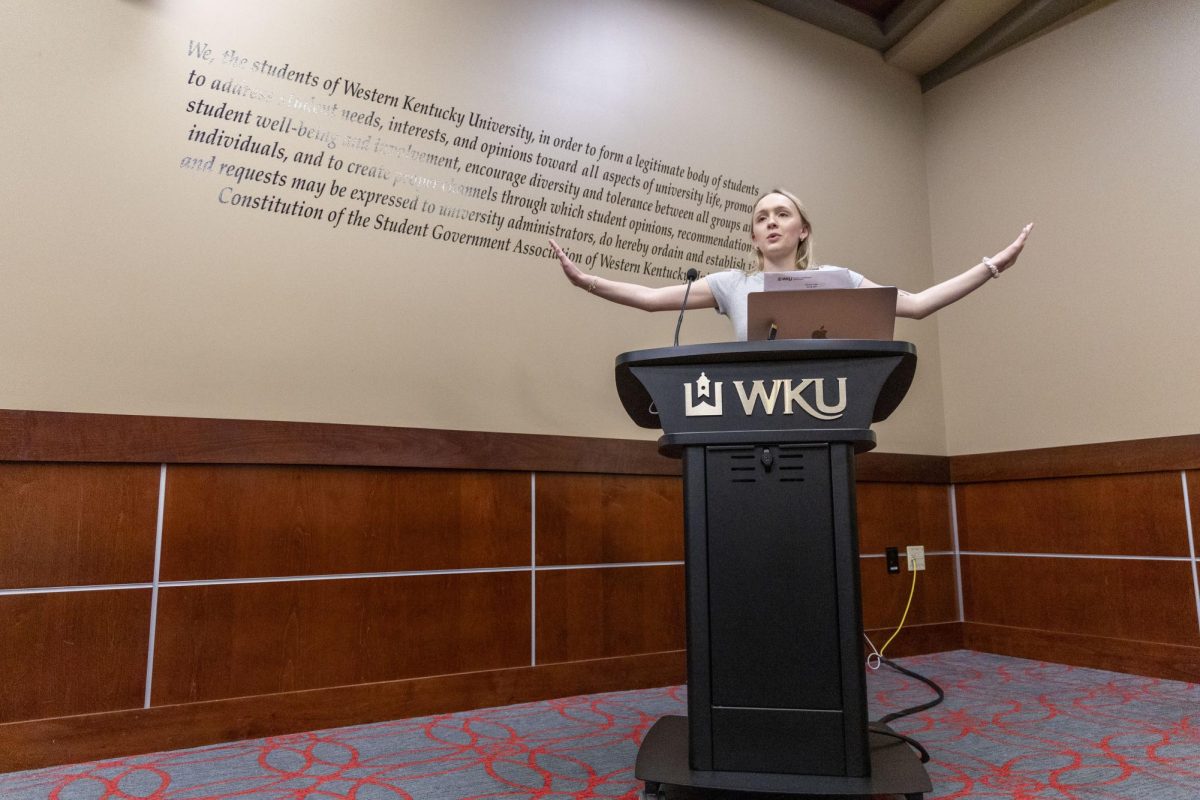Budget reductions include raising admission standards
February 27, 2018
WKU will no longer be admitting students with a Composite Admission Index score, or CAI, of less than 60, according to the budget restructuring plan announced on Friday.
The CAI is calculated using an applicant’s unweighted high school GPA and ACT score. The applicant’s GPA is multiplied by 20, and then the ACT score is added to calculate the CAI. Previously, WKU required a CAI of 65 or greater to guarantee admission, and applicants with a CAI score between 60 and 64 were “evaluated on a competitive basis,” according to the university’s website.
One of the accepted recommendations from the budget restructuring plan is to “revise admission policies/practices to end admission of undergraduate students with CAI scores below 60.” President Timothy Caboni also said he will evaluate the recommendation to look into “the implications of raising the CAI threshold to 65 or higher.”
At a press conference following the announcement of the budget restructuring plan on Friday, Caboni said WKU needs to admit students who have a “reasonable chance of being successful.”
“I think that has not been our past practice,” Caboni said at the press conference. “If there is a cohort of students we have admitted that have essentially a zero percent chance of graduating in six years, the question is, ‘Should we admit them?’ And I’ve said no. It’s not fair to them, it’s not fair to the families, it’s not fair to the folks that subsidize their educations.”
Caboni said the university would focus on maintaining the diversity of the student population with the change to admission standards.
“We will focus on ensuring that we [remain] a diverse institution,” Caboni said.
Richard Miller, vice provost for policies and personnel, said any time the minimum academic standards for admission are increased, there could be “significant impact for low-income minority students.” Miller said changing the CAI index did raise some concerns, but it would be difficult to tell what the impact would be.
“We’ll have to see the impact,” Miller said.
Miller also said raising the CAI was likely included in the budget restructuring plan, not as a cost-saving option, but as a way to improve “academic retention rates.” Miller said it would focus on students who would “persist longer than students who have a lesser academic profile.”
Jace Lux, director of recruitment and admissions, said he thought the change would affect all types of students who apply to WKU and “the percentages of students would likely remain the same.”
“I certainly think this is going to affect all students,” Lux said. “We have students of all backgrounds and underrepresented status as well as students who are in the majority who we admit based on their Composite Admission Index scores. That trend is going to spread across all student types.”
Later, Lux added that WKU has a high percentage of first-generation college students from all backgrounds. He said those students may be the most affected.
“I think first generation students may experience higher rates of admission decisions that were declined than non-first generation students, but that’s always been the case at WKU,” Lux said.
Lux said he thought the decision may have been made from a “performance funding standpoint.”
“I think the idea is that we want to get students who may not be ready for WKU who might come here and spend a semester or two semesters incurring debt…we want to get them to a place where they can be successful, get some preparation that they need so that they can come back to us later when they are prepared,” Lux said.
Lux said for the class that started in fall 2017, 255 students were admitted to WKU with a CAI between 60 and 64. Lux said of the 255 admitted, 86 enrolled in classes for that semester.
Lux also said the change would not affect students they are admitting for fall 2018 but would likely affect the class admitted for fall 2019, though that was not definitively known.
Both Lux and Miller said more information will become known in the coming days regarding changing the CAI. Lux said he found out about the change during the budget restructuring plan announcement. He said he would be working with others at the university “sooner rather than later” to work out the details.
Miller also said he was hopeful more information would be known soon.
“The devil is in the details, that will become more clear in the next few days or so,” Miller said.
Print managing editor Monica Kast can be reached at 270-745-6011 or monica.kast187@topper.wku.edu. Follow her on Twitter at @monica_kast.













